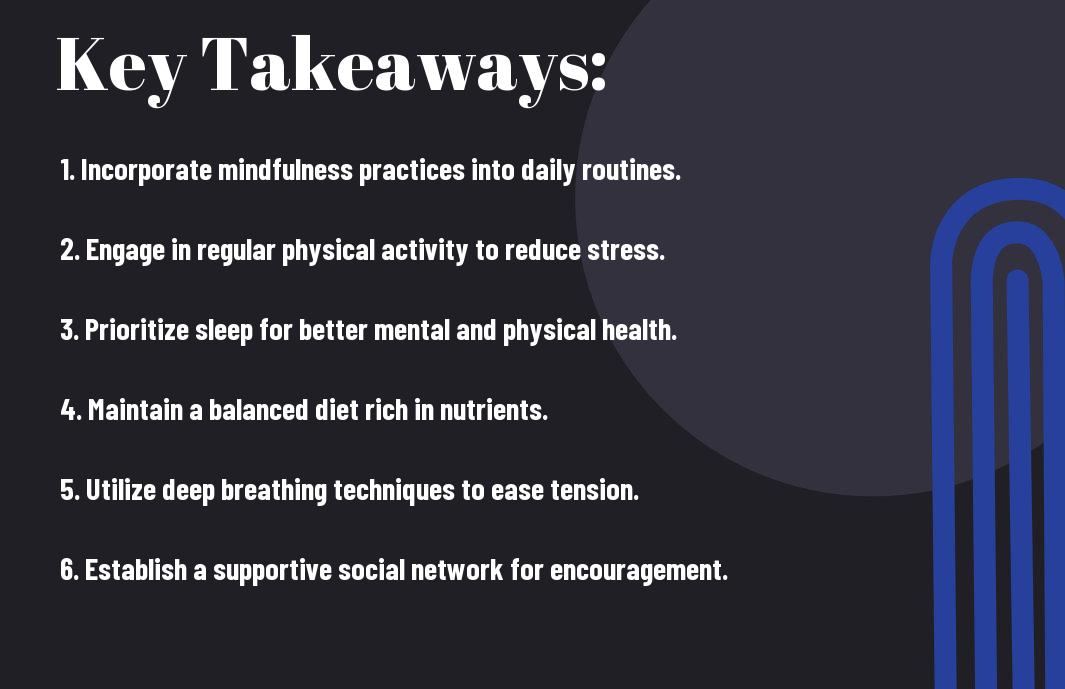Anxiety can often accompany your weight loss journey, making it challenging to stay focused on your goals. Fortunately, there are natural strategies you can implement to effectively manage stress and anxiety while shedding pounds. By incorporating practices such as mindfulness, balanced nutrition, and the right physical activity, you can create a supportive environment that fosters both mental clarity and physical well-being. This blog post will guide you through actionable tips that empower you to navigate the ups and downs of weight loss with greater ease and confidence.

Key Takeaways:
- Mindfulness Techniques: Incorporating mindfulness practices such as meditation or deep breathing can help reduce anxiety during the weight loss journey.
- Physical Activity: Regular exercise not only aids weight loss but also releases endorphins, which can significantly lower anxiety levels.
- Balanced Nutrition: Eating a variety of nutrient-dense foods can stabilize mood and energy levels, helping to combat feelings of anxiety.
- Sleep Hygiene: Prioritizing quality sleep is important, as inadequate rest can exacerbate anxiety and hinder weight loss efforts.
- Social Support: Engaging with supportive friends or joining a weight loss group can provide motivation and lessen feelings of isolation.
- Set Realistic Goals: Establishing achievable weight loss goals can prevent feelings of overwhelm and reduce anxiety related to expectations.
- Journaling: Keeping a journal to track thoughts, feelings, and progress can help individuals process emotions and manage anxiety more effectively.
Understanding Anxiety in Weight Loss
Anxiety is a common companion on the journey of weight loss, often arising due to the pressure to achieve specific results or fears regarding body image. This emotional response can derail your efforts, making it imperative to understand its roots and effects. Recognizing anxiety in this context allows you to adopt strategies that can help mitigate its impact, enabling a healthier and more sustainable weight loss experience. By addressing this emotional component, you can foster a more positive relationship with your body and weight management journey.
Causes of Anxiety During Weight Loss
For many, anxiety during weight loss stems from unrealistic expectations, comparison to others, or past experiences with dieting. Often, this pressure leads to a cycle of frustration and disappointment when desired outcomes aren’t met in a set timeline. Additionally, the fear of failure or regaining lost weight can amplify feelings of anxiousness, making it challenging for you to maintain motivation and commitment to your goals. Understanding these causes can empower you to counteract anxiety with healthier mindset shifts.
The Impact of Stress on Weight Management
Below the surface, stress can significantly hinder your weight loss efforts, affecting both your mental and physical well-being. High stress levels can lead to emotional eating and cravings for unhealthy foods, while also disrupting your metabolism and hormone balance, thus making weight loss more difficult.
Weight management is closely tied to stress levels, as the body responds to stress by releasing hormones like cortisol, which can increase appetite and cravings. When you’re overwhelmed, you might find solace in comfort foods, leading to unhealthy eating patterns that can sabotage your efforts. Moreover, stress often disrupts your sleep quality, further complicating your weight loss journey. Addressing stress through healthy coping mechanisms is imperative to ensure your weight loss goals remain achievable and sustainable.


Natural Techniques for Anxiety Management
Now, when it comes to managing anxiety during weight loss, various natural techniques can be beneficial. Incorporating practices like mindfulness, meditation, and structured breathing exercises into your routine can help you maintain a calm and focused mindset. You can explore more about these practices in the article on Stress Management Strategies for Weight Loss – MyCG.
Mindfulness and Meditation
Across different cultures, mindfulness and meditation have been recognized as effective tools for reducing anxiety. By focusing on the present moment and engaging in meditation practices, you can create a mental space that allows you to detach from stressful thoughts related to weight loss.
Deep Breathing Exercises
Anxiety often triggers a fight-or-flight response, which can lead to shallow breathing. Incorporating deep breathing exercises can counteract this tension. By consciously taking deep, slow breaths, you can help lower your heart rate and regulate your stress levels more effectively.
This technique involves inhaling deeply through your nose, holding the breath for a few seconds, and exhaling slowly through your mouth. Practicing this for just a few minutes daily can significantly improve your emotional well-being and enable you to approach your weight loss goals with a more balanced mindset.
The Role of Nutrition in Managing Anxiety
To effectively manage anxiety during your weight loss journey, focusing on nutrition is vital. The food you consume plays a significant role in influencing your mental health. Nutrient-dense foods can help stabilize your mood by providing vital vitamins and minerals, while a balanced diet promotes overall well-being. Incorporating foods that support mental clarity can enhance your focus and reduce the feelings of anxiety that may arise as you work towards your weight loss goals.
Foods That Reduce Anxiety
Around various food groups, you can find items that naturally reduce anxiety. Incorporating fruits, vegetables, whole grains, and lean proteins into your diet will provide your body with the necessary nutrients for optimal brain function. Foods rich in omega-3 fatty acids, such as salmon and walnuts, as well as leafy greens and nuts, can also contribute to lowering anxiety levels. Making these choices regularly will help create a more balanced mood.
Hydration and Mental Clarity
Any discussion of mental clarity must include hydration, as water consumption significantly impacts cognitive function. Dehydration can lead to fatigue, irritability, and difficulty concentrating, exacerbating anxiety levels. Thus, maintaining adequate hydration is vital for managing both mood and stress, ensuring that your body functions at its best.
Role of hydration in mental clarity cannot be overstated. Sufficient water intake supports optimal brain function, enhancing focus and alertness while reducing feelings of anxiety. When you’re well-hydrated, you’re better equipped to handle stressors, making it easier to maintain a positive mindset during your weight loss journey. Aim to drink enough water throughout the day, and consider incorporating hydration-rich foods, like fruits and vegetables, to further support your mental clarity and overall well-being.

Physical Activity as a Stress Reliever
Keep in mind that incorporating physical activity into your weight loss journey can be an effective way to manage anxiety. Engaging in regular exercise not only helps you shed pounds but also provides a natural outlet for stress relief, boosting your mood and enhancing your overall well-being. Whether it’s a brisk walk, a fun dance class, or a weight lifting session, finding ways to move your body can alleviate feelings of anxiety while contributing to your fitness goals.
Exercise and Endorphins
An important benefit of exercise is the release of endorphins, the body’s natural painkillers, which can significantly improve your mood. When you engage in physical activity, your brain begins to produce these feel-good hormones, leading to a sense of euphoria often referred to as the “runner’s high.” This powerful effect can counteract feelings of anxiety, making exercise a highly effective natural remedy while you work towards your weight loss goals.
Choosing the Right Workout
Around the journey of weight loss, selecting the right workout can make all the difference in managing your stress levels. You should consider various activities that not only suit your lifestyle but also align with your interests and fitness level. This personalized approach can help you stay committed to your routine and ensure that your exercise sessions are enjoyable rather than a chore.
A recommended method to choose your workout is to explore different options that resonate with you. Consider activities such as yoga for its calming effects, dancing for its fun and social aspects, or weight training for its empowering nature. Start with something familiar or intriguing, and gradually incorporate variations to keep your routine exciting. By engaging in workouts that feel right for you, you’ll be more likely to maintain consistency, reduce stress, and ultimately achieve your weight loss objectives.
The Importance of Support Systems
Many individuals underestimate the role of support systems in managing anxiety during weight loss. Connecting with friends, family, or online communities can provide emotional encouragement and shared experiences. When you face challenges, having people to lean on can help mitigate feelings of stress. Additionally, exploring nutritional strategies to ease anxiety may enhance your journey by ensuring you are in a balanced mental state as well.
Building a Support Network
Below, you will find that building a strong support network involves reaching out to like-minded individuals who understand your journey. Consider joining weight loss groups, either locally or online, where you can share experiences, successes, and setbacks with others. Engaging in group activities, discussions, or accountability partnerships can significantly uplift your motivation and resilience.
Professional Help: Dietitians and Therapists
Network with professionals such as dietitians and therapists to enhance your weight loss efforts. These experts can tailor guidance specifically to your needs and address mental health concerns that may arise during your journey.
Importance of seeking professional help cannot be overstated. Dietitians offer personalized meal plans that align with your preferences while keeping your mental well-being in mind. Meanwhile, therapists provide coping strategies for managing anxiety related to food and body image. Strengthening your skills in both areas can lead to a more balanced and healthier lifestyle, ensuring you remain focused and resilient throughout your weight loss journey.
Creating a Balanced Routine
For successful weight loss, it’s vital to establish a balanced routine that incorporates healthy eating, physical activity, and time for self-care. Alongside these habits, consider exploring 8 Supplements that Can Help Reduce Anxiety, According … to help manage stress during your journey. This holistic approach ensures you stay motivated and maintain focus on your goals.
Setting Realistic Goals
With clear, achievable goals, you can minimize feelings of anxiety during your weight loss journey. Setting targets that are specific and measurable fosters a sense of accomplishment and helps keep you motivated. Consider breaking down your overall goal into smaller milestones, allowing you to celebrate your progress along the way.
Incorporating Relaxation Practices
To effectively manage anxiety, it’s vital to incorporate relaxation practices into your routine. Engaging in activities such as meditation, yoga, or deep breathing exercises can provide you with time to unwind and refocus. These practices can help lower your stress levels and improve your overall emotional well-being.
Plus, finding a relaxation practice that resonates with you can create a sense of balance in your daily life. Whether it’s a morning meditation or an evening yoga session, prioritize these moments to recharge and connect with yourself. These mindful breaks will not only support your anxiety management but also enhance your resilience during the weight loss process.
To wrap up
Now, as you launch on your weight loss journey, incorporating natural anxiety management techniques can enhance your overall well-being. Practices like mindfulness, yoga, and deep-breathing exercises can help you maintain focus and reduce stress, making it easier to reach your goals. By prioritizing your mental health alongside physical changes, you empower yourself to create a balanced lifestyle that supports sustainable weight loss. Embrace these strategies to foster resilience and a positive mindset as you navigate this transformative process.
FAQ
Q: How can I manage anxiety while trying to lose weight?
A: Managing anxiety during weight loss can be achieved through various methods. Incorporating mindfulness meditation, yoga, or deep breathing exercises can help calm the mind. Establishing a balanced routine that includes regular physical activity, adequate sleep, and a nutritious diet also plays a vital role in reducing anxiety levels.
Q: Are there natural supplements that can help with anxiety during weight loss?
A: Yes, various natural supplements may assist in alleviating anxiety. Some popular options include magnesium, omega-3 fatty acids, L-theanine, and ashwagandha. Before starting any supplement, it is vital to consult with a healthcare professional to ensure it is suitable for your individual needs and circumstances.
Q: Is it normal to feel anxious while losing weight?
A: It is common for individuals to experience anxiety during weight loss. Changes in diet, lifestyle, and body image can trigger feelings of stress. Being aware of these feelings and finding effective coping strategies can help mitigate anxiety and enhance weight loss success.
Q: How does physical activity influence anxiety during weight loss?
A: Engaging in regular physical activity is beneficial for mental health and can significantly reduce anxiety levels. Exercise releases endorphins, which are hormones that promote feelings of happiness and relaxation. Moreover, accomplishing physical goals can boost confidence and lead to a positive mindset, aiding in weight loss efforts.
Q: Can a healthy diet impact anxiety levels during the weight loss process?
A: Absolutely. A healthy diet rich in whole foods, including fruits, vegetables, whole grains, and lean proteins, can help stabilize mood and reduce symptoms of anxiety. Foods high in vitamins, minerals, and omega-3 fatty acids support brain health and can enhance emotional well-being during the weight loss journey.
Q: What role does sleep play in managing anxiety during weight loss?
A: Quality sleep is fundamental for overall health and plays a significant role in anxiety management. Insufficient sleep can increase stress hormones and negatively affect mood and decision-making. Aiming for 7-9 hours of quality sleep each night can help improve emotional resilience and support effective weight loss efforts.
Q: How can I address emotional eating linked to anxiety during weight loss?
A: Identifying triggers for emotional eating is the first step in addressing this behavior. Keeping a food journal can help you recognize patterns between emotions and eating habits. Consider finding alternative coping strategies, such as engaging in a hobby, talking to a friend, or practicing stress-reduction techniques, to replace emotional eating with healthier outlets.





